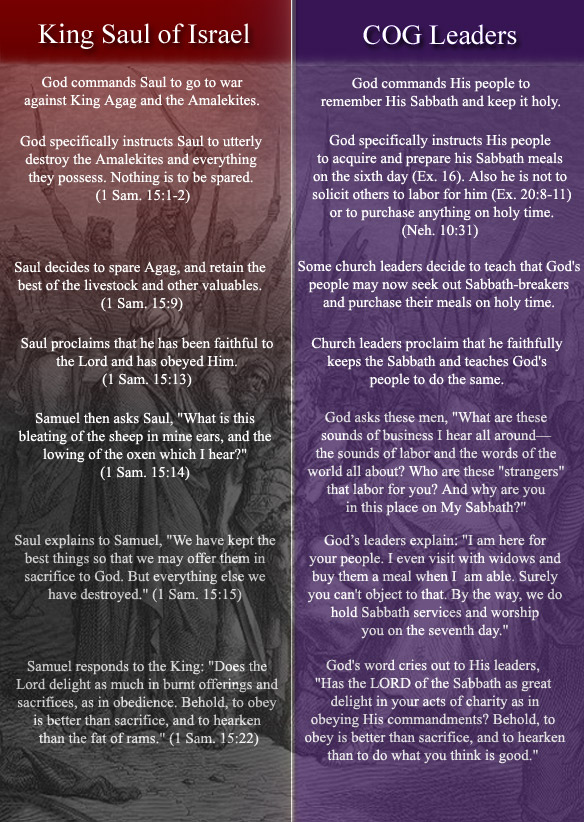


Excuse XIII
Rehabilitating Evil
Question:
How could God possibly be opposed to an act that makes it possible for His people to edify each other?
~~~
When defending the practice of dining out on the Sabbath, one COG leader contends that seeking out unbelievers, who profane what God made holy, can actually be an opportunity to encourage brethren as well as facilitate Christian love and service. He also argues that for some, dining out "offers the "only possible" opportunity for fellowship after services.” If this is true, what happens on the Sabbaths when no one dines out—no fellowship?
This pastor concludes his point by claiming that no reasonable person could believe that God would not appreciate this practice despite the fact that He specifically prohibits it throughout the scriptures. Here is how this minister advances this argument.
One of the greatest ways of encouraging one another and communicating sincere love for the brethren has been to share a meal upon coming together on the Sabbath. Someone who is single or a widower hardly ever has the opportunity to serve others a meal. Yet, they can use the liberty to invite other brethren for a meal on the Sabbath or High Holy Day at an appropriate restaurant
Dining out on the Sabbath (in moderation) has always been a special treat for those honored to serve others, as well as for the guests. The motive should always be to lift up, encourage and show other brethren that they are appreciated. For many brethren, who are scattered in various locations, eating at a restaurant offers the only possible opportunity for fellowship after services.
No reasonable mind believes that the God who said that “the Sabbath was made for man, not man for the Sabbath” would forego wonderful, vital fellowship among His children on the Sabbath so that worldly restaurant employees will still render the exact same service anyway—but now at someone else’s table.
Human Reasoning vs God's Law
These words reflect human reasoning at its very worst. The minister who offers them is suggesting that if an act of “charity” can be integrated into an act of disobedience, it nullifies the disobedience. By the way, this is the same reasoning advanced by the Protestant world when defending a host of traditions that fly in the face of scripture. Sadly, this line of thinking does not reflect God's wisdom. Instead, it is a desperate attempt to make something God hates look like something He loves.
The Bible declares that God takes no pleasure in sin (Psa. 5:4) and this holds true for the sin of others. This leader, on the other hand, not only embraces the sin, but asserts that partaking of its fruit advances the cause of Christian charity.
Jesus warned against this type of reasoning and explained what God thought of such arguments. Suffice it to say, it is not pleasant. When describing a time of judgment, the Messiah explained that hiding behind good works to justify sin carries no moral weight with the Almighty. Here are His words.
Not every one that saith unto me, Lord, Lord, shall enter into the kingdom of heaven; but he that doeth the will of my Father which is in heaven. Many will say to me in that day, Lord, Lord, have we not prophesied in thy name? And in thy name have cast out devils? And in thy name done many wonderful works? And then will I profess unto them, I never knew you: depart from me, you that work iniquity. (Mt. 7: 21-23)
This is exactly what this COG leader is promoting. He wants you to believe that seeking out Sabbath-breakers and paying for their labor pleases God because it is an opportunity to do good—this despite the fact that God prohibits His people from acquiring their Sabbath meals or having them prepared on the seventh day (Ex. 16). Additionally, the fourth commandment specifically prohibits soliciting unbelievers to labor on God’s Sabbath (Ex. 20: 8-11, Deut. 5:14).
It's Been Tried Before
This is not the first time someone has tried to justify sin by cloaking it in an act of righteousness. King Saul of Israel did the same thing when rationalizing his failure to follow God's instruction concerning how to prosecute a war with the Amalekites. Consider the similarities between what Saul did three thousand years ago and what this COG leader advocates today. They are striking.

A Crushing Pronouncement
As Samuel prepared to leave the king, he issued a final observation concerning what Saul had done and the consequences he would suffer for his disobedience. Notice what Samuel says.
For rebellion is as the sin of witchcraft, and stubbornness is as iniquity and idolatry. Because you have rejected the word of the Lord, He has also rejected you from being king. (1Sam. 15:23)
In these thirty-two words, judgment was pronounced on the first king of Israel. All that Saul had been given was going to be stripped from him because of his own pride and arrogance. Because this leader of God’s people thought he had a better way of doing things than the One who made him, his throne was going to be given over to someone who understood that Israel belonged to God, not to a king.
With this in mind, God’s leaders today would be well advised to consider that although the Sabbath was made for man (Mk. 2:27), it is God's Sabbath, not theirs. Furthermore, Jesus is its Lord (v 28), not them. This fact alone should inspire all His people to take serious pause before attempting to improve on God's instructions regarding holy time. King Saul thought he could do God one better as well and we all know how that turned out.
